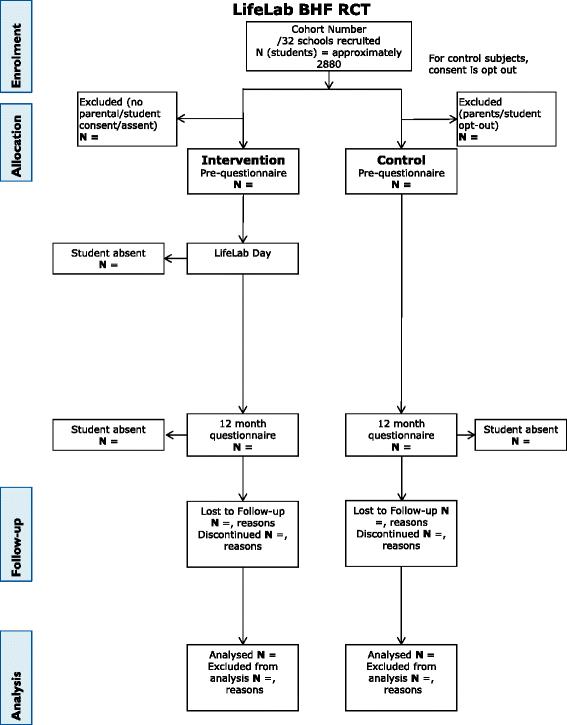Engaging teenagers in improving their health behaviours and increasing their interest in science (Evaluation of LifeLab Southampton): study protocol for a cluster randomized controlled trial
- PMID: 26292675
- PMCID: PMC4546100
- DOI: 10.1186/s13063-015-0890-z
Engaging teenagers in improving their health behaviours and increasing their interest in science (Evaluation of LifeLab Southampton): study protocol for a cluster randomized controlled trial
Abstract
Background: Lifestyle and health behaviours are strongly linked to non-communicable disease risk, but modifying them is challenging. There is an increasing recognition that adolescence is an important time for lifestyle and health behaviours to become embedded. Improving these behaviours in adolescents is important not only for their own health but also for that of their future children. LifeLab Southampton has been developed as a purpose-built classroom and laboratory in University Hospital Southampton. Secondary school students visit LifeLab to learn how childhood, adolescent and parental nutrition influences health, understand the impact of their lifestyle on their cardiovascular and metabolic health, and to inspire them with the excitement of research and future career possibilities in science. The LifeLab visit is part of a programme of work linked to the English National Curriculum. Pilot work has indicated that attitudes towards health can be changed by such LifeLab sessions.
Methods/design: A cluster randomised controlled trial is being conducted to evaluate the effectiveness of the LifeLab intervention, the primary outcome being a measurement of the change in nutrition, health and lifestyle literacy from before to after the LifeLab intervention. The LifeLab intervention comprises professional development for the teachers involved; preparatory lessons for the school students, delivered in school; a hands-on practical day at LifeLab, including a 'Meet the Scientist' session; post-visit lessons delivered in school; and the opportunity to participate in the annual LifeLab Schools' Conference. This study aims to recruit approximately 2,500 secondary school students aged 13 to 14 years from 32 schools (the clusters) from Southampton and neighbouring areas. Participating schools will be randomised to control or intervention groups. The intervention will be run over two academic school years, with baseline questionnaire data collected from students at participating schools at the start of the academic year and follow- up questionnaire data collected approximately 12 months later.
Trial registration: Evaluation of LifeLab is a cluster randomised controlled trial ( ISRCTN71951436 , registered 25 March 2015), funded by the British Heart Foundation (PG/14/33/30827).
Figures
References
Publication types
MeSH terms
Associated data
Grants and funding
- WT_/Wellcome Trust/United Kingdom
- MC_U147585827/MRC_/Medical Research Council/United Kingdom
- MR/N011848/1/MRC_/Medical Research Council/United Kingdom
- 17702/ARC_/Arthritis Research UK/United Kingdom
- MC_UP_A620_1017/MRC_/Medical Research Council/United Kingdom
- SOUDIBRU-2008-1/DH_/Department of Health/United Kingdom
- MC_UU_12011/1/MRC_/Medical Research Council/United Kingdom
- MC_UU_12011/4/MRC_/Medical Research Council/United Kingdom
- G0400491/MRC_/Medical Research Council/United Kingdom
- CRUK_/Cancer Research UK/United Kingdom
- MC_U147585819/MRC_/Medical Research Council/United Kingdom
- MC_U147574226/MRC_/Medical Research Council/United Kingdom
- PG/14/33/30827/BHF_/British Heart Foundation/United Kingdom
- MC_UP_A620_1014/MRC_/Medical Research Council/United Kingdom
- MC_U147574222/MRC_/Medical Research Council/United Kingdom
- RG/07/009/23120/BHF_/British Heart Foundation/United Kingdom
- MC_U147585824/MRC_/Medical Research Council/United Kingdom
- MR/J000094/1/MRC_/Medical Research Council/United Kingdom
LinkOut - more resources
Full Text Sources
Other Literature Sources
Medical


